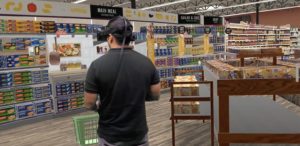Eye-Tracking VR Technology is Changing the Retail Industry
Retailers use virtual reality to conduct eye tracking consumer research that uncovers accurate shopper insights.
The pandemic and rapid digital transformation in retail is pressuring brands to innovate and adapt their shopping experiences based on changing consumer behaviors. In order to quickly collect and understand consumer insights, many organizations have turned to virtual reality.
Virtual reality provides lifelike visuals that change the way retailers test brick and mortar solutions and gather insights. Companies leverage virtual reality retail planning software to establish full-scale, store simulations that can be easily built, managed, and studied.

Virtual reality requires a lower investment of resources and provides more efficient data analytics than physical innovation labs. As a short-term and long-term investment, the virtual retail lab offers an incredible solution for in-store planning and testing.
Vive Pro Eye
These virtual store experiences are viewed and tested through virtual reality hardware with eye trackers. The Vive Pro Eye is one virtual reality headset providing eye tracking technology that retail companies are taking advantage of. The Vive Pro Eye captures up to 90 data points per second which provides accurate behavioral metrics on stopping power, total users noticed, dwell times, find times, and purchase volumes.
![]()
HP Reverb G2 Omnicept
HP Reverb G2 Omnicept is another virtual reality headset that is taking human response measurement a step further by providing biometric data including heart rate, face cam, and pupillometry. This type of powerful data collection will allow market researchers to gain even more finite details on shopper behavior. Ultimately, it will help them better understand what products, shelf layouts, and messaging will elicit a certain response from consumers.
Virtual Reality Retail Examples
VR in retail examples can be seen by organizations like Hershey’s and Kellogg’s.
The Hershey Company uses VR to create a virtual reality store and as a tool to test multiple planogram layouts. The company conducts retail VR research to measure different aisle anchors, aisle flows, and planogram sizes. The data from Hershey’s virtual reality consumer eye tracking studies is used to provide evidence based recommendations to retail partners. These ideas are implemented in the real world and increase sales.
![]()
Similarly, VR eye tracking in retail stores was done by Kellogg’s in order to test a new product line called Pop Tarts Bites. Kellogg’s VR research uncovered that placing their product on a lower shelf increased product sales by 18%, despite traditional merchandising research that would have suggested placing new products on higher shelves.
As VR and AR in retail advance, more brands will be able to cost-effectively test their retail environments. As a result, they can begin analyzing eye tracking data and improve the overall buying experience for consumers.
Subscribe to our newsletter
Get our blogs and the latest retail news delivered to your inbox monthly.
Recent Posts
5 Holiday Shopping Predictions & Recommendations for 2021
The pandemic greatly influenced celebrations and holiday shopping in 2020, but with normalcy on the horizon there are different 2021 holiday predictions that retailers should consider. Last year, the Covid-19 pandemic led to a decrease in holiday social gatherings. Although there were less family holiday celebrations and religious services, traditions such as decorating, gifts and…
Eye-Tracking VR Technology is Changing the Retail Industry
Retailers use virtual reality to conduct eye tracking consumer research that uncovers accurate shopper insights. The pandemic and rapid digital transformation in retail is pressuring brands to innovate and adapt their shopping experiences based on changing consumer behaviors. In order to quickly collect and understand consumer insights, many organizations have turned to virtual reality. Virtual…
7 Retail Industry Trends to Watch Out for in 2021
Today, the rapid advancements in technology have led to almost every facet of our lives shifting online, catering to a population that is more adaptive to the current times. The retail industry is no exception. The current world situation has vastly impacted retail industry trends in 2021, with an increasing number of people resorting to…



[…] retail industry is utilizing eye-tracking VR technology to efficiently develop and test checkout experiences. These tools offer a fast and cost-effective […]